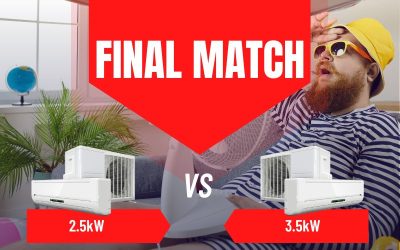Why Won’t My Air Conditioner Turn On?
There’s nothing worse than a malfunctioning air conditioner in a sweltering Brisbane summer. Even during the milder months, a heatwave could arrive at a moment’s notice and cause sweaty discomfort.
Whether the issue is at the office or home, it’s worth finding a solution ASAP.
If you’re trying to run a business, your customers will shy away from your hot and sticky store. With lost income adding up every day, the malfunctioning air conditioner could cost you a tidy sum. What’s more, your job satisfaction will plummet, and your staff will complain.
Should your air conditioner stop working at home, you’ll be sweating it out during your precious downtime. We work long and hard to make our lives comfortable, and there’s nothing more unpleasant than suffering through a hot day with no A/C.
While some faults require professional intervention, you can safely fix others alone. Your first step is to determine why your air conditioner won’t turn on.
To point you in the right direction, we’ve put together this A/C troubleshooting guide.
10 Reasons Why Your Air Conditioning Might Not Be Turning On
From clogged filters to blown fuses and flooded drain pipes, here are the most common reasons your air conditioning unit won’t turn on.
1 The Thermostat Isn’t Set Correctly
Sound excruciatingly obvious?
You’d be surprised how many people forget to check the thermostat. Have a look at the remote control and ensure the “cool” and “fan” functions have been turned on. Next, check the thermostat is set well below the current air temperature (at least 5C lower).
Is the display not showing anything at all?
Then you’ve probably got flat batteries. If you replace them and still don’t see anything on the screen, the remote control is likely broken. These aren’t worth trying to fix—just purchase a replacement instead.
2 The Power Isn’t Plugged in
Once you’ve ruled out an incorrectly set thermostat, it’s time to look for potential power source failures. Another obvious—yet often overlooked—culprit is an unplugged power cord. Check whether the power is plugged in and turned on at the wall.
Try multiple outlets to see whether there’s a failure in one particular powerpoint.
3 The Air Conditioner Shut-Off Switch Is Turned Off
Some air conditioners have a shut-off switch, which regulates the power supply to the unit. Refer to the owner’s manual to see whether your device has one and where it’s located. Once you find it, ensure it’s turned to the “on” position.
As the shut-off switch looks like a regular light switch, someone may have turned it off by mistake.
4 A Switch Has Tripped
If it’s still not working, you can’t rule out power supply issues just yet. It’s possible the power has tripped at the circuit breaker. This common conundrum occurs during horrendously hot days when your air conditioner is forced to work overtime.
Locate the circuit breaker in your electrical box and determine whether any switches have tripped. When a safety switch “trips,” it flicks back to the off position to avoid overloading the circuit. If the relevant switch is off, switch it back on and test the A/C unit.
Even if the switch hasn’t tripped, resetting it can help (just like turning a computer on and off again). Turn the switch off to that room, wait a moment, and turn it back on.
Sometimes, a single power-hungry appliance can cause a switch to trip repeatedly (hint: the kettle is a common culprit). Turn the safety switch off, unplug all the appliances and turn off the lights in the affected room, and then flick the circuit breaker switch back on. Turn the appliances back on, one by one, to see if any single device is causing the circuit to trip.
Replace the problematic appliance if necessary. Should this issue arise repeatedly or you notice lights flickering, you’ll need a licensed electrician to come and take a look.
5 The Air Filter Is Clogged
Did you know you’re supposed to clean out the air filter every three months?
A clogged-up air filter will stop the air conditioner from functioning effectively and may even cause the entire unit to stop operating.
Consult your owner’s manual for instructions on how to remove the air filter. If it looks clogged, give it a thorough clean or purchase a replacement part.
It’s crucial to purchase a compatible air filter; otherwise, the unit may not operate correctly. Look up the model number of your air conditioner and ensure the new part is compatible. The manufacturer will sell replacement air filters on their website. Give them a call if you’re not sure you’re purchasing the correct replacement part.
6 The Drain Pipe Has Flooded
If you’ve got an air conditioner with a drain pan underneath, take a look to see whether it’s full of water. The pan needs to remain empty, so the air conditioner can drain excess water, which accumulates due to condensation.
Should the pan be full enough to cover the drain pipe, it could be causing the issue. Empty the pan into the sink and put it back before testing your air conditioner again.
A clogged drain pipe or faulty drain pump could also be causing the issue. However, these require a degree of expertise to repair and should be left to a professional.
7 The Temperature Control Isn’t Working
A faulty temperature control sensor will stop your air conditioner from functioning correctly. The sensor constantly monitors the room temperature, so the air conditioner knows when to cycle on and off.
Take a look to see whether the fan is functioning correctly by activating the “fan only” setting on your remote control. When you adjust the temperature, you should hear a clicking sound as they connect.
If there’s no click, the temperature sensor is likely at fault, and you’ll need professional help.
8 The Control Board Has Malfunctioned
Modern air conditioners have a control board that manages all the individual components of the unit—kind of like a motherboard in a computer.
Sometimes, the control board can fail, which causes the air conditioner to cease functioning. Replacing it requires specialist skills and should be left to the pros.
9 There’s A Blown Internal Fuse
Your air conditioner can blow an internal fuse when it’s forced to work too hard, or the air filter is blocked.
A quality, modern A/C system has been engineered to function in most conditions. However, if your air filter has clogged up, the blockage will put extra pressure on the system as it tries to push cool air through the gunked-up filter. This excessive workload can cause a fuse to blow.
Replacing an internal fuse requires disassembling the unit. Should you fail to put everything back together correctly, you could cause severe damage to your air conditioner. For that reason, it’s best to seek professional help.
10 The Evaporator Coils Are Dirty
In an air conditioning unit, the evaporator coils cool the air by running a refrigerant through copper tubing. Should the coils become too dirty, the system may perform poorly or fail to switch on entirely.
While cleaning them is relatively straightforward, accessing the evaporator coils requires disassembling the unit. Therefore, diagnosing and cleaning the evaporator coils is best left to a professional.
What to Do When A/C Is Not Turning On
Some issues you can safely resolve yourself, while others require the assistance of a skilled air conditioner technician.
Before you call for professional help, ensure you’ve done the following:
- Plugged it in:
- Ensure it’s switched on at the outlet
- Test it with an alternative outlet if possible
- Check the A/C shut-off switch is turned on
- Checked the thermostat:
- Set the temperature to 5 degrees below the current room temperature
- Turn on the “fan” or “cool” setting
- Replace the batteries on the remote (or replace the remote itself) if necessary
- Checked your home circuit breaker:
- Flick the switch back on if it has tripped
- Reset the switch if it hasn’t tripped
- Turn appliances on one by one to see if a single device is causing the switch to trip
- Checked your air filter
- If it’s a bit dirty, try cleaning it
- If you can’t get it clean, order a replacement filter
For anything else (a busted temperature control, a faulty control board, a blown fuse, or dirty evaporator coils), you’re better off getting someone in.
Should I repair or replace my air conditioning system?
There comes a time when you’ll have to decide whether it’s better to repair or replace your air conditioner. While servicing is usually the preferred option, there are exceptions to the rule.
The typical lifespan of an air-conditioning unit is approximately 15 years—if you’re A/C is older than that, you’re probably better off replacing it. Furthermore, newer units that break down often, take too long to cool the house, or use an excessive amount of electricity should probably be replaced.
So what’s the best way to decide?
By seeking professional advice. With over 12 years of experience serving the Greater Brisbane region, Advanced Climate Solutions can identify the most cost-effective solution for you.
Our team of skilled A/C technicians will determine whether a replacement or service is the right choice and carry out the necessary work on your behalf.
Give us a call today to see how we can work for you.




